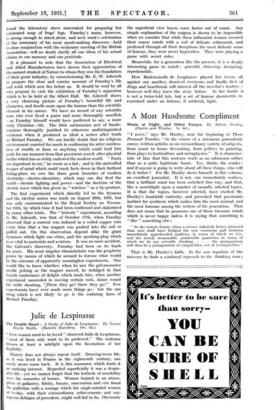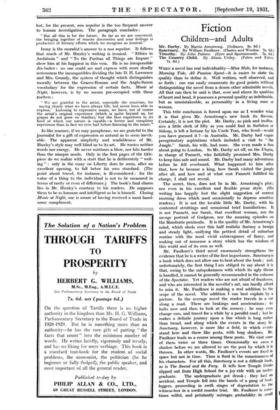A Most Handsome Compliment
Music at Night, and Other Essays. By Aldous Huxley. (Chatto and Windus. 7s. 6d.) " I HAVE," says Mr. Huxley, near the beginning of Those Personal Touches, " in the course of a strenuous journalistic career, written articles on an extraordinary variety of subjects, from music to house decorating, from politics to, painting, from plays to horticulture and metaphysics." It is character- istic of him that this sentence reads as an admission rather than as a quite legitimate boast. Yes, thinks the reader and if anyone is going to write about all these things, who will do it better ? For Mr. Huxley shows himself, in this volume, an excellent journalist. It is not, one immediately realizes, that a brilliant mind has been switched this way, and that, like a searchlight upon a number of casually selected topics. It is that the topics, however selected, have excited Mr. Huxley's insatiable curiosity, and provoked that passionate instinct for synthesis which makes him the most normal, and the most humane among the writers of his 'generation. That does not Mean that he possesses one of those tiresome minds which is never happy unless it is saying that something is " like " something else : " In the-rernote future, when a science infinitely better informed than ours shall have bridged the now enormous gulf between immediately apprehended qualities, in terms of which we HIM. and the merely measurable, ponderable quantities in terms of which we do our scientific thinking . . . the juxtaposition will then be a juxtaposition of compatibles, not of incompatibles."
That is Mr. Huxley's faith. In the non sequiturs of the universe he finds a continual reproach to the thinking man : but, for the present, non sequitur is the too frequent answer to human investigation. The paragraph concludes : " But all this is for the future. So far as we are concerned, the bringing together of remote discoveries and near feelings is productive of literary efforts which we recognize as ironical."
Irony is the moralist's answer to a non sequitur. It follows that much of Mr. Huxley's writing is ironical. " Ethics in Andalusia " and " To the Puritan all Things are Impure " show him at his happiest in this vein. He is no irresponsible Jix-baiter : no one could see and express with more deadly seriousness the incompatibles dividing the late D. H. Lawrence and Mrs. Grundy, the system of thought which distinguishes morally between the Graeco-Roman and the Anglo-Saxon vocabulary for the expression of certain facts. Music at Night, however, is by no means pre-occupied with these Matters : " We are grateful to the artist, especially the musician, for
saying clearly what we have always felt, but never been able to express.' Listening to expressive music, we have, not of course the artist's original experience (which is quite beyond us, for grapes do not grow on thistles); but the best experience in its kind of which our nature is capable—a bettor and completer experience than in fact we ever had before listening to the music."
In like manner, if we may paraphrase, we are grateful to the journalist for a gift of expression so natural as to seem inevit- able. The apparent simplicity and readableness of Mr. Huxley's style may well blind us to its art. He wastes neither words nor energy. He never mistimes a blow, nor hits harder than the ninepin needs. Only in the first pages of the title- piece do we realize with a start that he is deliberately " writ- ing " : only in the essay on Liberty does he seem, after an excellent opening, to fall below his own standard. (The point about travel, for instance, is ill-considered : for the value of a thing to the individual is not to be measured in terms of rarity or even of difference.) The book's final charm lies in Mr. Huxley's courtesy to his readers. He supposes them to be as humane and intelligent as he is himself. Closing Music at Night, one is aware of having received a most hand- some compliment.



































 Previous page
Previous page